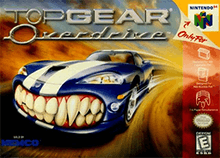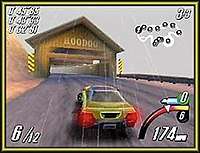Top Gear Overdrive
Top Gear Overdrive is a racing game released in 1998 for the Nintendo 64 and the sequel to Top Gear Rally. The game has support for high-resolution graphics if used with the Expansion Pak and features music from the band Grindstone.
| Top Gear Overdrive | |
|---|---|
 North American Nintendo 64 cover art | |
| Developer(s) | Snowblind Studios |
| Publisher(s) | Kemco |
| Composer(s) | Grindstone |
| Series | Top Gear |
| Platform(s) | Nintendo 64 |
| Release | |
| Genre(s) | Racing |
| Mode(s) | Single player Multiplayer |
Gameplay

In the main mode of play, the player races through six seasons, each season containing more races from more tracks, with faster cars competing.
At the beginning of the race the player starts at the back of the grid at the start line. Computer players at the front of the grid often start one-third of the way around the first lap. Players start with three charges of nitrous oxide, which are used to give the player a temporary speed boost.
While racing, the player can pick up two power-ups: nitrous oxide and cash. The nitrous oxide can be used straight away, while the cash is added to the winnings at the end of the race and used for buying upgrades to the player's car.
Shortcuts are available on each track, and often the use of these decide the outcome of the races, particularly in later seasons.
At the end of each race the player is presented with a screen to allow for various upgrades to their car, such as to acceleration and handling. The player is also able to change their car for a better (or worse) vehicle and can buy extra nitrous oxide to use in the next race.
At the end of the season, if the player places fourth or better in all of that season's tracks, they are allowed to progress to the next season.
Tracks
In later seasons all of the above tracks, with the exception of Space Truckin', are available mirrored and/or with a variety of weather conditions, such as snowing, thunder, and night time. As the player unlocks additional tracks, they will become available in all of the other game modes, except for Space Truckin', which can only be played in the main championship mode.
Soundtrack
The majority of the music tracks were written and performed by Grindstone.
Reception
| Reception | ||||||||||||||||||||||||||||
|---|---|---|---|---|---|---|---|---|---|---|---|---|---|---|---|---|---|---|---|---|---|---|---|---|---|---|---|---|
| ||||||||||||||||||||||||||||
The game received "favorable" reviews according to the review aggregation website GameRankings.[2]
References
- https://as.com/meristation/1998/12/15/analisis/913728480_012393.html
- "Top Gear Overdrive for Nintendo 64". GameRankings. Retrieved May 28, 2017.
- Marriott, Scott Alan. "Top Gear Overdrive - Review". AllGame. Archived from the original on November 16, 2014. Retrieved May 28, 2017.
- Edge staff (January 1999). "Top Gear Overdrive". Edge. No. 67.
- "Top Gear Overdrive". Electronic Gaming Monthly. 1999.
- McNamara, Andy; Anderson, Paul; Reiner, Andrew (January 1999). "Top Gear Overdrive". Game Informer. No. 69. p. 36. Archived from the original on May 27, 2000. Retrieved May 28, 2017.
- Vicious Sid (1999). "Top Gear Overdrive Review for N64 on GamePro.com". GamePro. Archived from the original on February 17, 2005. Retrieved May 29, 2017.
- GameSpot staff (January 4, 1999). "Top Gear OverDrive Review". GameSpot. Retrieved May 28, 2017.
- Shea, Cam (February 1999). "Top Gear Overdrive". Hyper. No. 64. p. 48. Retrieved May 29, 2017.
- Schneider, Peer (December 1, 1998). "Top Gear Overdrive". IGN. Retrieved May 28, 2017.
- "Top Gear Overdrive". Nintendo Power. Vol. 115. December 1998. p. 125.